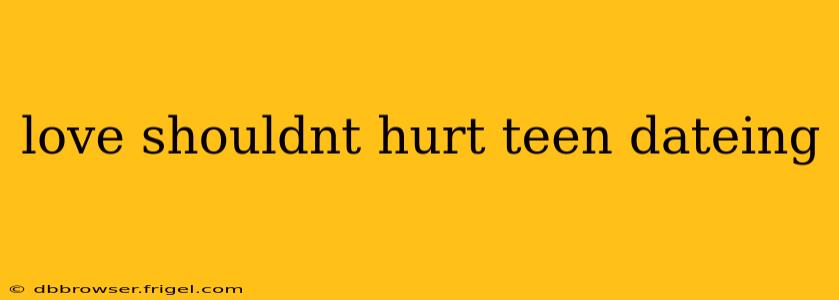Navigating the world of dating as a teenager can be exciting, confusing, and sometimes, downright scary. While the thrill of romance is undeniable, it's crucial to remember that healthy relationships are built on respect, trust, and mutual understanding. The idea that "love should hurt" is a dangerous myth, and it's vital for teens to understand the signs of unhealthy relationships and how to protect themselves. This guide aims to help teens navigate the complexities of dating while prioritizing their well-being and safety.
What is Healthy Dating?
Healthy teen dating involves mutual respect, open communication, and a sense of equality. Both partners should feel comfortable expressing their feelings, needs, and boundaries without fear of judgment or punishment. A healthy relationship fosters personal growth, encourages individuality, and supports each other's aspirations. It should never involve coercion, control, or violence, physical or emotional.
What are the Signs of an Unhealthy Relationship?
Recognizing the signs of an unhealthy relationship is crucial for protecting yourself. Some red flags include:
- Controlling Behavior: Your partner tries to dictate your friendships, clothing choices, or activities. They may become angry or jealous if you spend time with others.
- Jealousy and Possessiveness: Excessive jealousy can be a sign of insecurity and control. A healthy relationship allows for individual friendships and activities.
- Verbal Abuse: This includes name-calling, insults, threats, or constant criticism. No one deserves to be verbally abused.
- Physical Abuse: Any form of physical violence, including hitting, slapping, pushing, or any other form of physical harm, is unacceptable.
- Emotional Abuse: This can involve manipulation, gaslighting (making you question your own sanity), humiliation, or isolation from friends and family.
- Isolation: Your partner tries to isolate you from your friends and family.
- Pressure to Engage in Sexual Activity: Consent is crucial. Any pressure or coercion to engage in sexual activity is a significant red flag.
- Threats and Intimidation: Your partner uses threats or intimidation to control you.
What if I'm in an unhealthy relationship?
If you recognize any of these signs in your relationship, it's crucial to seek help. Talk to a trusted adult, such as a parent, teacher, counselor, or other family member. You are not alone, and there are resources available to support you.
How Can I Have Healthy Relationships?
Building healthy relationships starts with self-respect and understanding your own boundaries.
- Communicate Openly and Honestly: Talk to your partner about your feelings, needs, and boundaries.
- Respect Boundaries: Respect your partner's boundaries, and expect them to respect yours.
- Practice Consent: Consent is crucial in all aspects of a relationship, especially sexual activity. Consent must be freely given, enthusiastic, and ongoing.
- Trust Your Gut: If something feels wrong, it probably is. Don't ignore your intuition.
- Set Healthy Limits: Know your limits and stick to them. Don't be afraid to say "no."
- Build Healthy Friendships: Maintain a strong support system of friends and family.
- Seek Help When Needed: Don't hesitate to reach out for help if you need it.
How can I talk to my partner about my boundaries?
Talking about boundaries can be challenging but is essential for a healthy relationship. Start by identifying what your boundaries are. Then, choose a safe and private space to talk to your partner. Use "I" statements to express your feelings and needs without blaming your partner. For example, instead of saying "You always make me feel bad," try "I feel hurt when..." Be prepared to listen to your partner's perspective and work together to find solutions that respect everyone's boundaries.
Where can I get help if I'm experiencing dating violence?
There are numerous resources available to help teens experiencing dating violence. You can contact:
- The National Domestic Violence Hotline: They offer confidential support and resources.
- Your School Counselor: School counselors are trained to provide support and guidance.
- A Trusted Adult: Talk to a parent, family member, teacher, or other adult you trust.
Remember, love should never hurt. If you are in an unhealthy relationship, there are people who care and want to help. Your well-being is important, and you deserve to be in a safe and healthy relationship.
